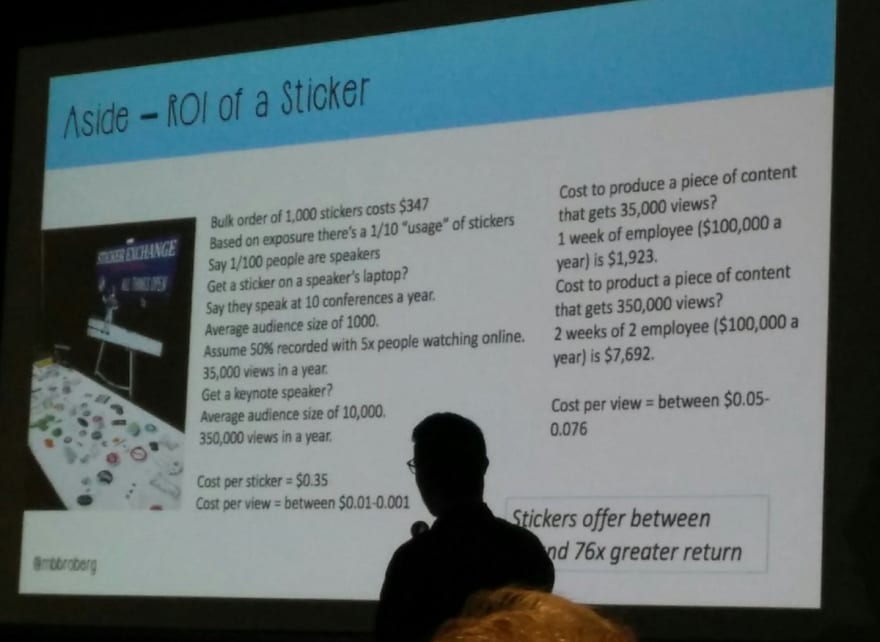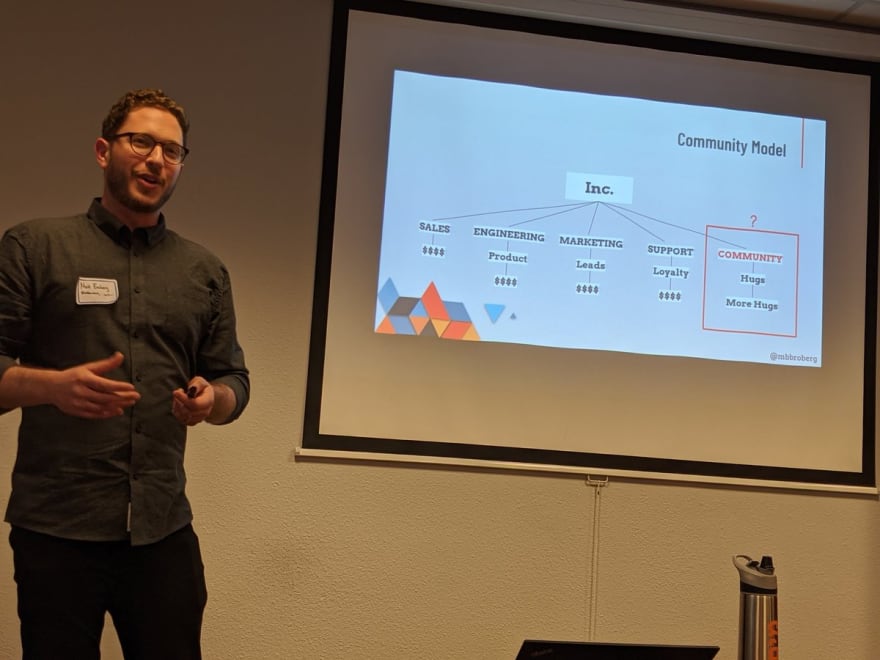Here's the TL;DR: I recently became the lead maintainer of the CHAOSS Value Working Group, and its mission to define standard metrics that help us fund the incredible work of community builders (including DevRel, Community Managers, OSPO, and everyone else).
More than ever, we need standardized metrics of success for community builders. If you work in communities -- open source or not, software or hardware, startup or enterprise or nonprofit -- I need your help.
Share and learn together by discussing community value in the project repo to get started right away.
I know you have a unique set of metrics, just like every single one of us does. I've tried to measure everything I could and some I shouldn't (example below). If you're curious why, read more about my story so you know where I'm coming from.
 ROI on stickers. TLDR stickers good. #CLS17 @mbbroberg15:30 PM - 06 May 2017
ROI on stickers. TLDR stickers good. #CLS17 @mbbroberg15:30 PM - 06 May 2017
My highs and lows of community metrics
There is an uncomfortable truth that permeates all community work inside the IT industry: if that work, at any point, is no longer considered valuable to the employer, then it is no longer funded.
The first story that comes to mind for me is when that goes well.
The first time I learned to articulate the value of community in the form of a business metric, I landed a huge amount of funding to bring the program to life. Our community had the funds to travel to conferences, create meaningful swag that brought us together as a tribe, and prominent mentions in all of my executive sponsor's presentations.
The metric we decided on -- Share of Voice -- was one we collaborated on with the Press and Analyst Relations team (PR/AR). It was respected as a metric in our organization, and for six quarters we showed how a community in a large proprietary vendor could make a huge impact. I was open and honest about how we measured success, and members made sure we succeeded.
That program died, and it broke the hearts of all involved.
I had left that job, and some of the executive team did as well. In that shuffle, the perception of community value disappeared. The program that so many of us put my blood, sweat, and tears into building lost its glisten and was shutdown. My Twitter DMs filled that day with the full spectrum of grief. Somewhere those sending me reassuring "I'm sorry for your loss," while members of the group vented to me about the shortsighted move. It didn't matter that I no longer worked on the program: that community was still my community, and I was sad for us all.
I learned the hard way that communities where corporate funding is essential either thrive or fall apart depending on a non standard set of business metrics. Those of us who work in this space don't have the certainty of quotas in Sales or even the convention of lead generation in Marketing. We have the nebulous and shifting perception of value.

 Czarknado 🦈🌪️@pczarkowski
Czarknado 🦈🌪️@pczarkowski Everyone in the business is tied to generating revenue, except community who just generate hugs. - @mbbroberg #CHAOSScon13:48 PM - 31 Jan 2020
Everyone in the business is tied to generating revenue, except community who just generate hugs. - @mbbroberg #CHAOSScon13:48 PM - 31 Jan 2020
Metrics are a means to an essential ends
How do you keep your community funded? It's an odd question on the surface. When I hear the word 'Community,' dollar signs don't come to mind. I think about the people I hug as soon as I see them at conferences (I can't wait for hugs to be a thing again). I think of how friends who taught me that Twitter could be a place be inspired by great people back in 2010, and how they pulled me into conferences and local user groups and essentially kickstarted my career. I think about how every job I've had has an element of fun and friendship that I call "community work."
It's at that point that I'm reminded of the many times these communities were not perceived as valuable in a corporate context. Despite the immediacy of feedback, the people who told me they bought products because of community recommendations, or the comparisons to other organizations that spend more and produce less, community remains a category of work that falls in the corporate gaps between org charts.
That's why we measure. It's not because the measurement is what matters the most, but it's because metrics matter to our organizations. They can -- within reason -- guide healthy behaviours as well documented by the CHAOSS project.
What's your community metric?
Here's where you come in. I'm asking all community professionals to share your metrics of success that have a track record of keeping you and your community funded.
If we do this, we can build all of our most effective metrics into a standard library of great advice to prove our value, and then use open source software to give us the tools to track them.
We all know the truth of the matter: if we don't measure, we don't sustain funding.
My hope, and the purpose of the CHAOSS Values Working Group, is to help us all do so. Please join us in the conversations under GitHub issues or in our bi-weekly calls. I'm excited to see us succeed together.






Top comments (0)